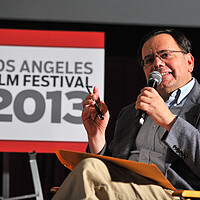What’s the best way to capture Leonard Bernstein?
Loading...
The arrival of “Maestro,” the new movie about Leonard Bernstein starring Bradley Cooper, prompts the perennial question: Is it possible to successfully dramatize the life of a great artist?
If you focus primarily on the life and not the art, the artist may get lost in the shuffle. If you attempt to link the events of that life with the art that issued from it, the results can be specious and simplistic. Focusing on the art while skimping on the life can be equally unsatisfactory. Also, how do you believably convey the throes of creation – particularly when it involves writing or painting or musical composition – without serving up a slew of hokey “aha” moments?
“Maestro,” which covers the life of the revered conductor-composer from the mid-1940s through the mid-1980s, falls heavily into the first two traps. Directed by Cooper, who also co-wrote the script with Josh Singer, the film serves up so much Sturm und Drang about the great man’s messed-up private life that it barely bothers to explore his creative genius.
Why We Wrote This
Dramatizing the life of a great artist can be fraught. The biopic “Maestro” focuses on conductor and composer Leonard Bernstein’s personal life. But what of his art?
Clearly Cooper didn’t want to make a standard biopic. The narrative, shot in black-and-white until it switches to color halfway through, is often choppy and vertiginous. He scrupulously avoids hall-of-fame moments. The genesis of “West Side Story,” for example, Bernstein’s most famous credit, registers as little more than a blip on the screen.
The film’s center is instead occupied by Bernstein’s deeply loving and deeply troubled marriage to the Chilean American actress Felicia Montealegre (Carey Mulligan), whom he wed in 1951 and with whom he had three children before she died in 1978. (Bernstein lived another 12 years.)
What gives this union, at least potentially, its dramatic resonance is that Bernstein – whose flings and affairs in the film are all with men – was indiscreetly bisexual. Felicia was not deluding herself about Lenny (as practically everyone in the movie calls him). She tells him early on, “I know exactly who you are,” yet she wants to give the marriage a shot anyway.
“Maestro” frames the romance as a fraught but soulful bonding between two kindred spirits, and yet what comes across is more like a shared folly. This despite the fact that Mulligan’s poignant performance is the film’s main saving grace.
As the years rack up, we can see how Felicia’s gamble in marrying this man has not paid off. The soul-deep connection may be there, but not – until the very end, when she is dying – the love and kindness she craves.
From Cooper, whose prosthetic makeup in the early scenes is more distracting than convincing, we get mostly histrionics. The chain-smoking Lenny is all aquiver, on the podium and everywhere else. The film perpetuates the same fallacy as the overwrought “Tar,” starring Cate Blanchett as a crazed-genius conductor. Bernstein’s inner and outer lives are made to seem all of a piece, as if this fusion is what made him a true virtuoso. It’s that old Hollywood cliché: An artist is indistinguishable from his art, even though, in reality, his creations often have little or nothing to do with his private character. And because “Maestro,” apart from indiscriminately pumping the soundtrack with his music, delves so perfunctorily into Bernstein’s artistry, even this cliché doesn’t get a full airing.
Will audiences who have never heard of Bernstein except via “West Side Story” be drawn to this movie?
There is so much more to him, both as a man and a musician, than this film cares to encompass.
Instead of watching “Maestro,” I would recommend listening to Bernstein’s great orchestral recordings of Mahler, Sibelius, Beethoven, and so many others. Or his scores for “Candide,” “On the Town,” “On the Waterfront,” or “The Age of Anxiety.” His “Young People’s Concerts” TV lectures, the finest introductions to classical music I know, are available on the internet and DVD. Therein lie the real riches.
Peter Rainer is the Monitor’s film critic. “Maestro” is rated R for some language and drug use. The film opens in select theaters Nov. 22, and will be available on Netflix Dec. 20.








